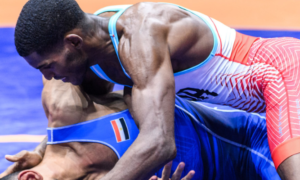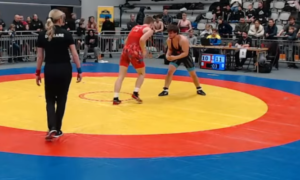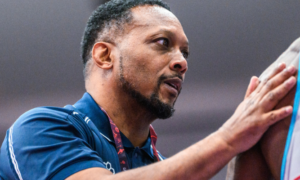The Army’s World Class Athletes Program takes its military status quite seriously, as you might suspect. Wrestlers do have Military Occupational Specialties (MOS) along with various other obligations to the service branch which take precedence over on-the-mat pursuits. Moreover, they don’t actually call themselves “wrestlers”, certainly not most of the time. Conversationally, even in the most informal of settings, they prefer the term “soldier-athletes”, though no one will hastily correct you should another pronoun be applied.
But when limiting the discussion surrounding Army/WCAP’s presence to how it functions as a US National Greco-Roman entity, most cannot help but to ignore the photos of well-known names in Battle Dress Uniforms or whatever their Army job titles actually are. Their devotion to serving the country’s best interests, at home or abroad, becomes instantly obscured by performance results. And in this regard, that is easy to understand.
Why?
Because they are, very often, dominant.
None of this is a secret. Army Wrestling, in one form or fashion dating back decades, has produced dozens (and dozens) of elite Greco competitors. World Team members, Olympians, and too many National champs and All-Americans to list — for to do so would require many minutes of scrolling down this here page. The Minnesota Wrestling Club (Minnesota Storm) is perhaps the country’s flagship team, beholden to a legacy by which all others are measured. But — Minnesota enjoys a pipeline. A highly-efficient and passionately-run feeder system, half a century of documented success, and a state that is on or near equal footing (in all three participated styles) pertaining to said success undoubtedly speaks for itself.
The New York Athletic Club, a financial pathway that breathes life into competitive opportunities for Seniors, must be mentioned due to its influence on shaping the careers of countless Greco athletes. Though it is not a “team” the same way Army or Minnesota Storm are. NYAC wrestlers are spread out all across the country residing in different training environments. It’s about funding. Checks written to wrestlers and sent via snail mail accompanied by updated singlet designs. However, that does not disqualify NYAC from holding an extremely important place in the annals of American Greco-Roman history, in case you are unaware of annual results from the US Open.
Army/WCAP stands apart in contemporary USA Greco because, this generation, it is the closest approximation the sport has (domestically) to the New York Yankees. Greco wrestlers want to compete for WCAP similar to how free agents want to play in the Bronx. They want to be recruited. State-of-the-art resources, coaches boasting sparkling resumes, a room filled with stars, the chance to earn a living chasing Olympic gold, and by all accounts a unifying atmosphere, make Army/WCAP the premier destination for serious wrestlers who don’t mind swapping civilian pleasures for what is, ostensibly, a direct route to legitimate wrestling professionalism.
Let’s see what that looks like in a more concentrated format relative to results.
Recently on this platform, a crude yet data-driven rendering of the top 21 US Seniors this lustrum was offered. A generous handful of athletes who either currently compete for WCAP or did previously made the cut. After expanding results past the criteria observed in that article (multiple World Team Trials and US Open victories and/or finals appearances), it was deemed appropriate to focus solely on Army/WCAP’s collective performance over the same time-span in an effort to demonstrate its degree of effectiveness.
Army/WCAP Domestic Greco-Roman Results
US Nationals & World Team Trials
Notes:
- The first US National tournament following the Rio Olympics was contested in December of 2016 with the proceeding World Team Trials four months later.
- Athletes who were not part of Army/WCAP at the time a result was achieved are consequently not listed.
- Athletes currently ranked in the top-20 by United World Wrestling are displayed with their ranking on first appearance but not after.
- Results from World Team Trials Challenge Tournaments are only separated for 2019 due to Greco-Roman’s inclusion in the Final X Series.
- Athletes who lost in “National Team matches” at a World Team Trials tournament (i.e., “true second”) are listed as having placed fourth for brevity.
- Results for both US Opens and World Team Trials are accounted for up to 7th place (where applicable).
2016
US Nationals
59 kg
1. Hayden Tuma
2. Ryan Mango (world #14)
3. Max Nowry (world #3)
66 kg
1. Ellis Coleman
4. Marco Lara
75 kg
5. Mason Manville
80 kg
4. Jon Anderson
85 kg
4. Lucas Sheridan
98 kg
5. JD Souza
130 kg
1. Toby Erickson
2. Jacob Mitchell
2017
World Team Trials
59 kg
1. Ildar Hafizov
2. Hayden Tuma
3. Max Nowry
4. Ryan Mango
66 kg
1. Ellis Coleman
75 kg
1. Mason Manville
4. Dillon Cowan
80 kg
3. Courtney Myers
85 kg
3. Jon Anderson
4. Lucas Sheridan
98 kg
4. JD Souza
130 kg
2. Toby Erickson
3. Jacob Mitchell
2018
US Nationals
55 kg
1. Max Nowry
60 kg
2. Mike Fuenffinger
6. Ildar Hafizov
63 kg
1. Ryan Mango
4. LilShawn Greedy
67 kg
1. Ellis Coleman
7. Connor Myers
82 kg
4. Courtney Myers
5. Vlad Dombrovskiy
97 kg
3. Lucas Sheridan
130 kg
5. Alton Meeks
World Team Trials
55 kg
2. Max Nowry
60 kg
2. Ildar Hafizov
4. Mike Fuenffinger
63 kg
2. Ryan Mango
4. LilShawn Greedy
67 kg
1. Ellis Coleman
3. Hayden Tuma
77 kg
2. Mason Manville
97 kg
3. Lucas Sheridan
130 kg
4. Jacob Mitchell
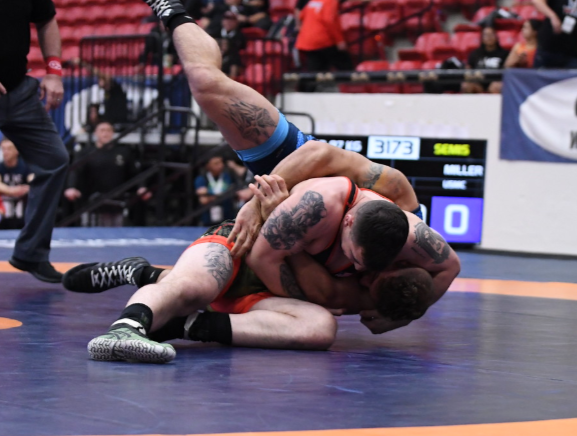
Lucas Sheridan (red) was turning into a solid all-around Senior in ’17 when he finished fourth at the World Team Trials at 85 kilograms behind teammate Jon Anderson. The next season, Sheridan went up to 97 kilos and became a National Team member for the first time. In ’19, Sheridan won the World Team Trials Challenge Tournament and finished second at the Final X Series (Trials finals). When the Olympic Trials finally arrive in America, Sheridan will be observed as a serious contender. (Photo: Army/WCAP)
2019
US Open
55 kg
1. Max Nowry
60 kg
1. Mike Fuenffinger
2. Ildar Hafizov
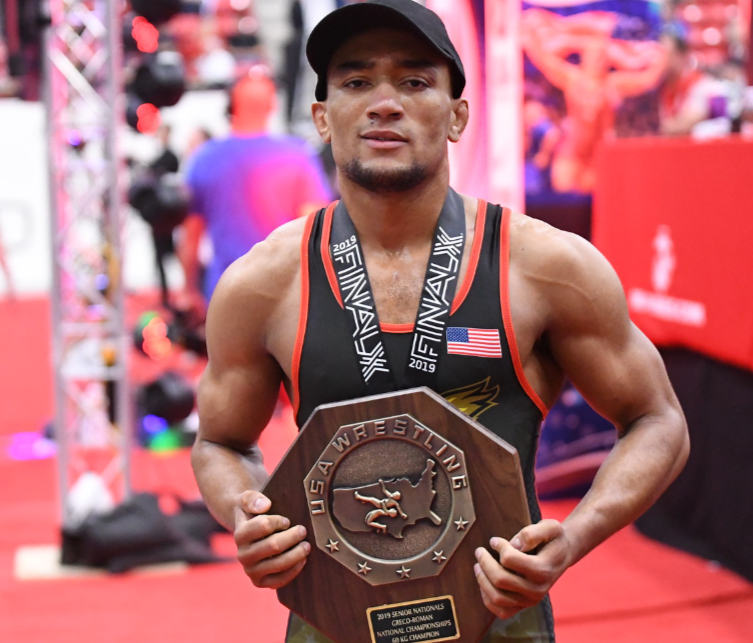
After winning back-to-back National titles this past year, Mike Fuenffinger (60 kg) has firmly taken his place among the top names in the sport domestically. (Photo: Army/WCAP)
63 kg
1. Ryan Mango
67 kg
1. Ellis Coleman
2. Hayden Tuma
72 kg
3. Michael Hooker
7. Connor Myers
87 kg
5. JD Souza
97 kg
2. Lucas Sheridan
130 kg
1. Jacob Mitchell
3. Toby Erickson
World Team Trials Challenge Tournament
60 kg
1. Ildar Hafizov
67 kg
2. Hayden Tuma
72 kg
2. Michael Hooker
3. Alex Sancho (world #19)
97 kg
1. Lucas Sheridan
130 kg
2. Jacob Mitchell
4. Toby Erickson
Final X
55 kg
1. Max Nowry
60 kg
1. Ildar Hafizov
2. Mike Fuenffinger
63 kg
1. Ryan Mango
67 kg
1. Ellis Coleman
97 kg
2. Ellis Coleman
US Nationals/Olympic Trials Qualifier
60 kg
1. Mike Fuenffinger
6. Ryan Mango
7. LilShawn Greedy
67 kg
1. Alex Sancho
6. Michael Hooker
87 kg
1. Jon Anderson
97 kg
2. Lucas Sheridan
130 kg
2. Jacob Mitchell
3. Toby Erickson
Results/placings at major domestic tournaments are one thing. Consistency is another, and ultimately necessary for a lineup to retain its potency.
Army, lauded around the country the past two seasons for the advent of its “Ninja Squad” (wrestlers occupying the four lightest weight categories, all of whom are World Team-caliber competitors, or close to it), still remains anchored by proven middle and upper-weights. The rise of Lucas Sheridan at 97 kilograms this quad in conjunction with steady hands Jon Anderson (87 kg), Toby Erickson (130 kg), and Jacob Mitchell (130 kg) have more than supplemented WCAP’s performance both individually and as a team. JD Souza, befallen by an injury last year, has made significant strides, as well. If healthy entering next season, Souza will be noted as a viable competitor at the Last Chance Olympic Trials Qualifier, and potentially beyond. He is but one example of the kind of depth that has made Fort Carson the most fearsome practice room in the nation.
Such is why a full picture is desired. The “Ninja Squad” receives the most attention at the moment — and rightfully so. In 2019, the first four weight classes on the World Team featured WCAP wrestlers. But, as you can see, Army performs at virtually every weight category. They will continue to. Their room is going to grow by several more in the months coming up, and the talent pool will sustain long into the future.
For a conclusive footnote regarding the exploration into Army/WCAP’s performance since the fall of 2016, the compressed statistics below shall suffice.
- 7 World Team appearances (led by Coleman with three — ’17, ’18, and ’19).
- 13 National Champions.
- 22 National finalists.
- 34 All-Americans from US National/US Open tournaments.
- Of the 72 finals bouts contested including US National events and World Team Trials (and counting the Olympic Trials Qualifier from December of ’19), 37 have featured at least one Army/WCAP representative.
Listen to “5PM37: The wildman Sammy Jones” on Spreaker.
SUBSCRIBE TO THE FIVE POINT MOVE PODCAST
iTunes | Stitcher | Spreaker | Google Play Music








